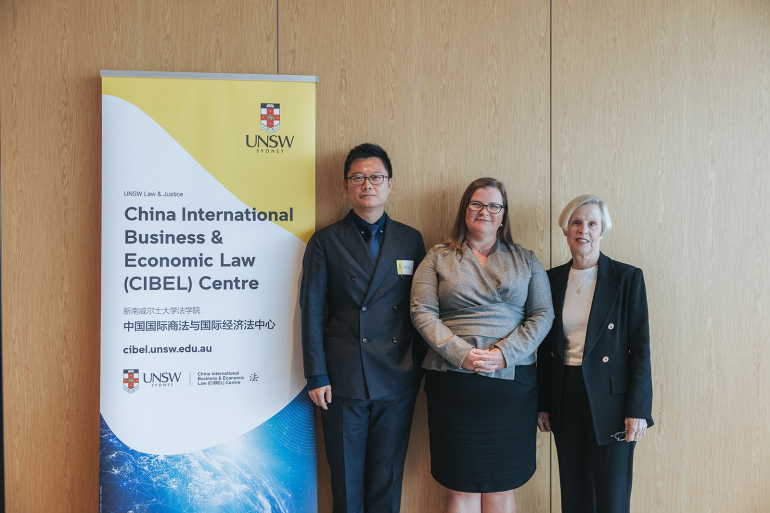13 June 2024
The 2024 CIBEL-NFACR Conference held on the 11 April brought together global legal, academic, business, and industry experts to discuss ‘Australia-China Business in the Digital Age: Navigating the Rapids.’ This full day conference was a result of UNSW CIBEL’s ‘Competition Law in the Digital Age: Enhancing Australian and Chinese Business Understanding’ project grant, supported by the National Foundation for Australia-China Relations (NFACR).
The conference was split into four sessions. UNSW CIBEL Co-Director Professor Deborah Healey opened the conference and was followed with The Foundation’s Deputy CEO, Ms Helen Horsington’s Welcoming Remarks which highlighted their work with China The conference was split into four sessions. UNSW CIBEL Co-Director Professor Deborah Healey commenced the conference, followed by The Foundation’s Deputy CEO, Ms Helen Horsington, whose Welcoming Remarks emphasised the importance of a stable and constructive Australia-China relationship for both countries' economies, fostering mutual growth through collaborative efforts. She also highlighted the Foundation’s role in supporting enhanced engagement between Australia and China in Australia’s national interests.
Professor Healey chaired the first session which explored ‘Digital Economy and Competition in China and Australia’. Professor Liyang Hou of Shanghai Jiao Tong University offered his expertise on ‘Competition and Regulation in China’s Digital Economy’, Ms Kate Reader of the Australian Competition & Consumer Commission conducted ‘An Overview of Australia’s Digital Platform Services Inquiry’ and Ms Yan Yu of RBB Economics Singapore explored ‘Navigating digital services trade in challenging times.’
CIBEL Co-Director Associate Professor Weihuan Zhou chaired the second session on the ‘Regulatory Landscape of Digital Trade.’ Mr David Yardley of the Department of Foreign Affairs and Trade and Mr Xiongshan Cai of Kuaishou Research Institute presented on ‘Policymaking and bilateral, regional, and global cooperation from Australia’s perspective’ and ‘What does digital trade regulation mean for business’ respectively. This was followed with commentary by Mr Jack Lu of Austrade and Professor Henry Gao of Singapore Management University. Mr Lu also spoke of his ‘Experience on retail eCommerce: trends, challenges, and opportunities’ and Professor Gao explored ‘Digital trade regulation in broader contexts at the regional/global level, such as RCEP, DEPA & WTO JSI.’
After lunch, session three commenced with Dr Anton Didenko as the Chair. Scientia Professor Ross Buckley discussed the ‘Cross-border use of CBDCs: design options and challenges’, Ms Urszula McCormack of King & Wood Mallesons spoke on ‘Australia/China cross-border CBDC initiatives’, Dr Mark Staples of CSIRO explored ‘Tokenising real-world assets: the underlying technology and risks’, and finally Ms Joni Povich of Badasi ‘Legal and regulatory implications of tokenising real-world assets for digital trade.’
The conference concluded with session 4, as Associate Professor Kun Fan led the discussion on ‘Dispute Resolution in Digital Trade.’ Ms Fei Lu of the China International Economic and Trade Arbitration Commission conducted an ‘Overview of dispute resolution in the digital environment in China’, Ms Edwina Kwan of King & Wood Mallesons explored ‘Dispute resolution in the digital environment: Australia’s perspectives’, finally Ms Pui-Ki Emmanuelle Ta of eBRAM and Ms Kiran Sanghera of the Australian Centre for International Commercial Arbitration discussed ‘Navigating the challenges and strategies for resolving cross-border digital trade disputes: institutional dialogues’ respectively.
CIBEL would like to thank everyone who participated and joined the 2024 CIBEL-NFACR Conference. We look forward to continuing working with The Foundation and our global contacts and stakeholders.
Conference recordings are now available on our website, check out the links below for the inspiring discussions:
